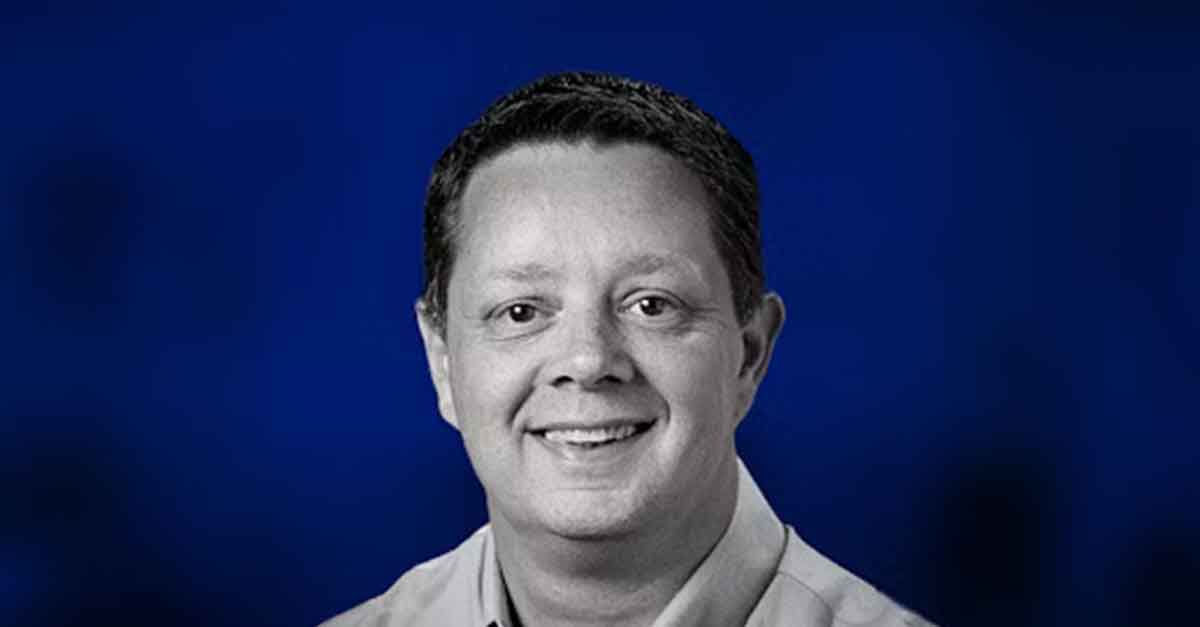Al Gresch: Yeah, so good morning, Al Gresh here. We're at the Florida Biomedical Society Symposium in Orlando, Florida. Just backdrop of a Disney world here and I'm here this morning with Larry Hurtsler. I've known Larry for a great number of years. Most of the time Larry was with Aramark Technology or Aramark Health System and Larry's now with TRIMEDX. So Larry, why don't you tell me a little bit about how that transition came about and what your role is with TRIMEDX.
Larry Hertzler: Absolutely. Good morning everybody. Great to be here talking with Al. Like you said, some of us old guys in the industry have to stick together. We've known each other for a very long time. TRIMEDX actually purchased the Aramark Healthcare Technologies Business a little over a year ago. Aramark was looking to get out of the technology space and focus on really their worldwide competencies in the food and facilities world which they are incredible at. And so, the opportunity to join TRIMEDX came up and it has been wonderful. I mean it is really when you think about being part of an organization that that's all they do is clinical engineering, a company that was founded by people that turned wrenches really understand what this industry's about. And it has been just fascinating to get in the middle of it.
Larry Hertzler: Now the company's grown a tremendous amount. I worked with them before I went to work for Aramark in 2005 but they were much smaller back then and almost everything that they're doing has advanced. One of the phenomenal things is just the investments that they've made in some of the support systems in writing their own software and integrating everything that they do. It's really a formidable group of experts all working on things to make the technician's life better. And it's really been exciting to see that.
Al Gresch: Yeah, I've seen a lot of growth in the company. And for those of you that don't know, I worked for TRIMEDX for a time myself and had a great time. They're a faith-based organization, so a lot of respect for the people there. So Larry, you're here this morning giving a keynote address on the topic of benchmarking.
Larry Hertzler: Right. Precarious benchmark.
Al Gresch: Precarious benchmarking. And Larry talked about some of the pitfalls of benchmarking in his talk this morning, framing things appropriately, making the right correlations. And so, talk about that little bit, Larry, and some of the challenges that exist with benchmarking today.
Larry Hertzler: Yeah, absolutely. Over the years, I've been involved in it a lot either directly or indirectly with the organizations that I've worked with enough to see that there are a lot of potential pitfalls if people don't fully understand how to look at the numbers. Again, my favorite is averages. And I'll repeat what I said this morning. On average, bBill Gates and I make exactly the same amount of money. True statement, there is a big difference between $23,000 a minute and what I make, but on average we make the same. So, if you're not careful, averages can be very, very misleading and caused the bad things to happen. Unintended consequences where you don't really understand the numbers. So most of what I wanted to talk about today was just to really give people an awareness of what you do have to pay attention to and what are some things that can get in your way if you're not really thinking right.
Al Gresch: Yeah. I know that from my own background, back when I worked at Aurora Healthcare and Alexian Brothers before becoming part of TRIMEDX. Everything that we did was data-driven. And we spent a tremendous amount of time cleaning up our data, making sure that our technicians all documented everything that they did and all did it in the same way. We got to that point where we could actually rely on the numbers, but there really was no benchmarking that existed, reliable benchmarking outside of our own organization. Because you didn't know how much you could rely on the data that was shared. So, what we focused on instead was benchmarking internally against ourselves. So, what are some of the challenges that you've seen around that from an industry's perspective around benchmark?
Larry Hertzler: I think what you experienced is really what everybody does. You're comfortable with your own data, you know how to interpret it. It's a lot easier to come up with things that you can improve. And bottom line, that's what you're trying to do is move your numbers to get better. A big bonus to compare it to outside folks. And that's been really difficult. As I mentioned before, I was in a big project with nine academic medical centers to try and benchmark clinical engineering programs back in the 80s and it fell apart because we couldn't agree on who needed to change so that we could normalize all of our data sets and measure each other the same way. So, we gave up on that. But I think really back off from the data and start thinking about processes instead. And you'll probably make more progress that way because you can look at how you think about things or how things work as opposed to just what the raw numbers are and make a big step forward in terms of comparisons.
Al Gresch: Oh, that's a great point. And I've had similar conversations with a great number of people that it's much less important what your baseline is.
Larry Hertzler: Right.
Al Gresch: But find a baseline and then work to improve on that. Where were you last year versus where you are in this year? And as long as you continue to progress and making improvements year over year, that's really what you have to focus on.
Larry Hertzler: And on top of that, making sure you understand what caused the change. What did you do differently that moved that number? Because a lot of numbers move year to year to year to year. It's hard to tell, did you cause it, or did it move for some other reason? So, making sure that you understand all the pieces of the puzzle is pretty important.
Al Gresch: Yeah. I've also said that the number is nothing more than an indicator. And so, we had mean numbers for average time to PM, average time for a specific type of repair. And if I saw a technician that was outside of that mean on the plus side or the negative side, it wasn't time to get a baseball bat and they were looking for that guy. But it was a time to ask the question why. Because if the time was less, was it because the guy was skipping steps that he shouldn't be skipping? Or was it because in the course of his life doing this, he found tricks that allowed him to do it quicker and more efficiently. And if that's true, wouldn't you want everybody doing that? And so those are the kinds of things that draw you toward those constant process improvements. On the flip side of it, if he was above that mean, well was it because he learned that if I do this additional thing, it's going to prevent future failures? Once again, wouldn't you want everybody doing that if that's true?
Larry Hertzler: That's right. And that's why large amounts of data are better than small amounts, trends over time can tell you things that individual episodes or short episodes can't. To try and figure out the work orders and looking at somebody's trouble guessing or troubleshooting. You can get it right every once in a while, trouble guessing, but you can't over the long haul. So, it’s really understanding what's behind the data as you mentioned is the important part to know whether you're really making a change or not.
Al Gresch: Well, Larry, you've been in the industry ... We're both old guys, we've been here. We've been in the industry for a long time. A lot of discussion and angst around AEM. Certainly, this topic comes into play relative to AEM. So, in your experience, both with Aramark and your current position, tell me how you see benchmarking helping out support supporting AEM programs in our industry.
Larry Hertzler: Sure, absolutely. AEM, and I know a lot of people talk about it solely as a cost initiative, which I think is incorrect. Cost is an outcome if you're figuring out the types of things. But it really is about a quality perspective. Identifying those steps that if you don't do them or you do them differently, don't cause any change in the performance or the longevity or the capabilities of that machine. By definition, those are the only things you're allowed to put on an AEM program. So yeah, they will result in cost savings. That shouldn't be the reason that you're going about doing this. It is about efficiencies. So, I think it does get exactly to the data. You really have to understand what you're seeing in the data, how you're tracking it. To your point at the previous places, making sure that everybody's capturing the data in the same way so that you know what you're trying to get out of it. And I think a lot of people are in different stages in the development of the AEM programs. It's one of the big advantages that being large is, the fact that we have so many different sites and collecting so much data, we can see patterns quicker than maybe others can just be based on their sheer size and the volumes that we have.
Al Gresch: Yeah, it's very interesting. A couple of events that I've been in and even in a session this morning, I'm compelled to ask the question, what has kept you from implementing an AEM program? And the answer is always the same. Lack of data to support decisions that I'm making.
Larry Hertzler: Absolutely right.
Al Gresch: That's an issue. So we talked a little bit about in an initiative that we're collaborating with or with other CMMS vendors with AAMI, Matt Beratich, and Carol Davis-Smith are facilitating those meetings. But our hope is to come up with some standard. You call that out in your talk this morning that there really is a lack of standards in our industry. Our feeling is that if we can come up with a consistent set of things like requests, codes, a result codes and false codes with clear definitions that people could start with. And we're never going to force everybody. But if we can get some people to adopt that standard. From a CMS vendor perspective, I can tell you that many of our new customers are looking for best practices.
Al Gresch: Tell me what I should do rather than, just take what I've done before and replicate it because there's a tremendous opportunity when you're making that switch to adopt best practices. And so, understanding the direction that we're going and we're looking to find some quick wins. I would expect that we'll look to do a presentation at Amy in the years coming on the successes of that. Do you have any words of caution or weariness for us as we go down that path?
Larry Hertzler: I think you mentioned the key thing is, who is going to adopt, changing all of their systems? It's expensive and time-consuming to make changes to assist them to meet another standard. So I guess one thought we'd be, is there a way to define what you're trying to collect so that everybody can convert their data there without having to change their data systems, but almost like a map tells you, I use these three codes, those all map to your one. I can do that externally. I don't have to change my system. That way you potentially can get the comparison data that you're looking for, but the individuals don't have to change how they do their business. I don't know that that's possible or not, but that's what came to mind.
Al Gresch: Well, and the reason we started down this path in the first place is, I looked at my own history and had we not gone through those steps of standardizing and defining those codes, getting things to the point where everybody was doing the same thing, there's no way that we could have benchmarked internally.
Larry Hertzler: But likely other sites have done that same thing, or at least down that path. And it's probably not exactly the codes that you used.
Al Gresch: Yeah, I'm okay joining in as long as you use my code.
Larry Hertzler: Yeah, exactly. So, I'm just saying how do you translate their codes to a common code that ... A lot of what we're trying to collect as all the same different words for it, some slight nuances. Just figure out how to map it to the right categories.
Al Gresch: I'm guessing somebody on my team could perhaps come up with some machine learning tools to help do that.
Larry Hertzler: Yeah, potentially.
Al Gresch: Great advice, Larry. So just in wrapping up here, are there any other thoughts you have on how to move the needle relative to benchmarking? Because it has been decades that we've been trying to do it without success.
Larry Hertzler: It has. No magic pills, nothing, no specific advice other than it is, the same message in the continuous improvement world. Little by little will get us there. You can't get there all at once. It looks like an impossible task, so a lot of people just give up at the beginning, but I think if we just continue to eat away at it, we'll get there.
Al Gresch: Well, us old guys aren't ready to give up just yet.
Larry Hertzler: Absolutely not.
Al Gresch: And I think the point that is most important is let's focus a little bit less on the baseline number and focus on year-over-year improvement.
Larry Hertzler: Absolutely, absolutely.
Al Gresch: Well, Larry, it was a pleasure talking with you this morning. Thanks for joining us.
Larry Hertzler: Absolutely. Thank you.
Al Gresch: Stay tuned for more episodes from the Healthcare chats podcast, submit your questions online and let us know what topics you'd like us to cover. Peace out.







